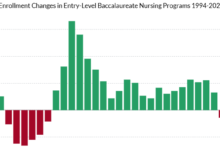Martha’s Rule rolled out across 143 hospitals in England

NHS England has announced that the patient safety initiative known as “Martha’s Rule” is set to be rolled out in 143 hospitals before March 2025.
The rule is intended to make it easier for patients and families to get an urgent care review of their own or their family member’s case if concerns about a deteriorating condition are not being responded to.
“I am in no doubt this programme will deliver clear change and it has been so encouraging to see how many hospitals have shown interest”
Aidan Fowler
It is named for Martha Mills who died from sepsis aged 13 in 2021 when staff at King’s College Hospital failed to escalate her to intensive care in time to save her life after concerns were raised by her family about her deteriorating condition.
NHS England confirmed funding for the initiative in February this year and said it would be rolled out initially in at least 100 sites.
This has since been expanded to 143 locations (see list below) because of “significant interest” from frontline clinicians, NHS England has said.
The roll-out will be evaluated over the course of the year to March 2025 and inform future proposals for Martha’s Rule to be expanded across all acute hospitals, if it receives further government funding.
Hospitals implementing Martha’s Rule will offer an escalation process available 24/7. This will enable patients and families to contact a critical care outreach team to assess a case and escalate care if needed.
Martha’s Rule will be advertised throughout the hospitals on posters and leaflets, so that patients and families are informed of how to contact the critical care outreach team.
NHS staff, including nurses, will also be able to use the same process to contact a critical care outreach team when they have concerns about a patient’s deteriorating condition.
Family members’ insights and information about a patient’s health will also be recorded daily, ensuring changes in condition and behaviour noticed by those close to them are taken into consideration by staff.
NHS national patient safety director and senior responsible officer for Martha’s Rule, Dr Aidan Fowler, said: “Working closely with Martha’s parents and colleagues across the NHS over the last few months on this rollout, I am in no doubt this programme will deliver clear change.
“It has been so encouraging to see how many hospitals have shown interest in being part of delivering these all-important patient safety measures this year,” he said.
Dr Fowler added: “With new processes that enable both patients and staff to raise concerns if they see someone’s condition worsening, and the inclusion of patients and their loved ones’ insights in medical records, these measures can help us better identify and manage deterioration as part of wider work, which is a key priority for us and will no doubt lead to improvements in the care patients receive.”
Related articles on Martha’s Rule
Martha Mills suffered a pancreatic rupture when falling onto the handlebars of a bike when on holiday with her family, and was then subseqently treated at King’s College Hospital NHS Foundation Trust.
Martha’s condition deteriorated quickly and the signs of sepsis were not acted upon by hospital doctors fast enough.
The coroner’s report concluded that “if she had been referred promptly and had been appropriately treated, the likelihood is that she would have survived her injuries”.
Parents Merope Mills and Paul Laity have campaigned since their daughter’s death for the introduction of Martha’s Rule, modelled after Ryan’s Rule, a similar system introduced in Australia.
Speaking in November, Ms Mills told nurses they must do more to back patients when relatives feel they are being ignored.
When the roll out of Martha’s Rule to hospitals in England was announced in February, Royal College of Nursing director for England Matricia Marquis said nursing staff were patients’ greatest advocates, and that they “stood ready” to ensure the rule has an “immediate impact” and leaves a “lasting legacy”.
“By listening and engaging, nursing staff and other clinicians can not only help to reduce anxiety but take important steps to improve care and advance learning,” Ms Marquis said.
She added: “Safe and effective levels of nursing staff will be crucial to the implementation of Martha’s Rule, ensuring there are enough professionals with capacity to provide a second opinion when called upon to do so.
“We welcome the evaluation that will be undertaken as part of the rollout into the NHS in England.”
The chair of the British Association of Critical Care Nurses, Ian Naldrett, told Nursing Times that his organisation was “fully supportive” of the development of Martha’s Rule.
“Widening access to critical care advice and skills, ensuring that patients and their families and carers have a voice when detecting deterioration and are supported when safety concerns are raised is paramount,” he said.
“It is for the wider NHS to ensure that there are enough fully trained critical care nurses within the health system to ensure that when deterioration is detected, timely transfer in to a competently staffed and equipped critical care bed is consistently available,” Mr Naldrett added.




